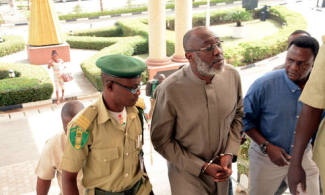
The Nigeria Prisons Service has said that putting handcuffs on the National Publicity Secretary, Peoples Democratic Party, Chief Olisa Metuh while appearing for his trial at the Federal High Court in Abuja on Tuesday was at the discretion of the prison officer, who supervised his court appearance.
The Nigeria Prisons Service has said that putting handcuffs on the National Publicity Secretary, Peoples Democratic Party, Chief Olisa Metuh while appearing for his trial at the Federal High Court in Abuja on Tuesday was at the discretion of the prison officer, who supervised his court appearance.
The NPS spokesman, Francis Enobore, said the officer in charge of the escort that took Metuh to court was at liberty to determine if the inmate should be handcuffed based on a security situation, the environment and intelligence report made available to him.
Enobore made the clarification following comments in the media and by PDP, that putting handcuffs on Metuh is a plot by the All Progressives congress -led to subdue the major opposition party.
Enobore, in a telephone interview with one of our correspondents, stated that Metuh was not maltreated in any way, stressing that handcuffing an inmate was a standard procedure, which the prison warden could employ based on the situation at hand.
He said, “Handcuffing an inmate is at the discretion of the officer-in-charge, depending on the security situation, the environment and intelligence report available to the officer. Sometimes they look at the atmosphere and take the necessary decision.
“If you suspect that the atmosphere, security-wise, may not be conducive to the inmates in your custody, you can use handcuffs; to avoid a situation where you have to start telling stories, you use your discretion to study the environment and take appropriate measures to ensure the safety of the inmates in your custody.
“Remember that we not only try to secure the inmate from escaping, we equally provide protection for the inmate. The officer in-charge must ensure that the life of the inmate is not jeopardised. It is the officer in-charge of the escort that studies the security environment and takes the decision to use handcuffs.”
Asked if there was intelligence that Metuh might escape or was in danger of being harmed, Enobore said he did not know because he was not at the scene.
He dismissed suggestions that the PDP spokesman was handcuffed to please the Presidency, saying there was no political consideration in the treatment of inmates by the prisons service.
Justice Abang had, on January 15, ordered the accused person to be remanded in Kuje Prison shortly after his arraignment on seven counts of money laundering preferred against him by the EFCC.
The EFCC alleged in the charges that Metuh, who was arraigned along with a firm, Destra Investments Ltd, received N400m, part of the money meant for the procurement of arms, from the Office of the National Security Adviser in November 2014.
The EFCC alleged in the case, marked FHC/ABJ/CR/05/2016, that Metuh and Destra, through their account with Diamond Bank Plc, collected the sum of N400m from the NSA office on November 22, 2015, for PDP’s campaign activities.
The prosecution also alleged that the N400m was “part of the proceeds of an unlawful activity” of the immediate past NSA, Col. Sambo Dasuki (retd.).
It alleged that Metuh and Destra transferred the sum of N21.8m to Anenih and they (Metuh and Destra) thereby committed an offence contrary to Section 15(2) (b) of the Money Laundering (Prohibition) Act, 2011 (as amended in 2012) and punishable under Section 15(3) of the same Act.
The judge ordered on Tuesday that Metuh should not be released from custody until he met the bail conditions.
But in granting him bail on Tuesday, the judge dismissed EFCC’s objection to the application, ruling that the allegation that Metuh destroyed his statement and attempted to influence potential witnesses while in the custody of the anti-graft agency, was not substantiated.
Justice Abang added, “The truth of this allegation has not been established. The prosecution said that he, the first defendant, if granted bail, will try to influence potential witnesses.
“In my humble view, this is speculative. The court of law cannot act on speculation.
“The alleged conduct of the first defendant while in custody of the EFCC cannot be used as a factor or taken into consideration in refusing the bail to the first defendant.”
He said the offenses that Metuh was accused of were bailable and that the accused still enjoyed constitutional right to being presumed innocent until proved guilty.
Metuh was arrested by the EFCC on January 5 and remained in the custody of the anti-graft agency till when he was arraigned on January 15.
The judge however dismissed the second prayer contained in Metuh’s bail application seeking an order restraining the EFCC from re-arresting him after being granted bail.
Metuh’s separate fundamental human rights enforcement suit is scheduled to come up for hearing before Justice Abang on Wednesday.